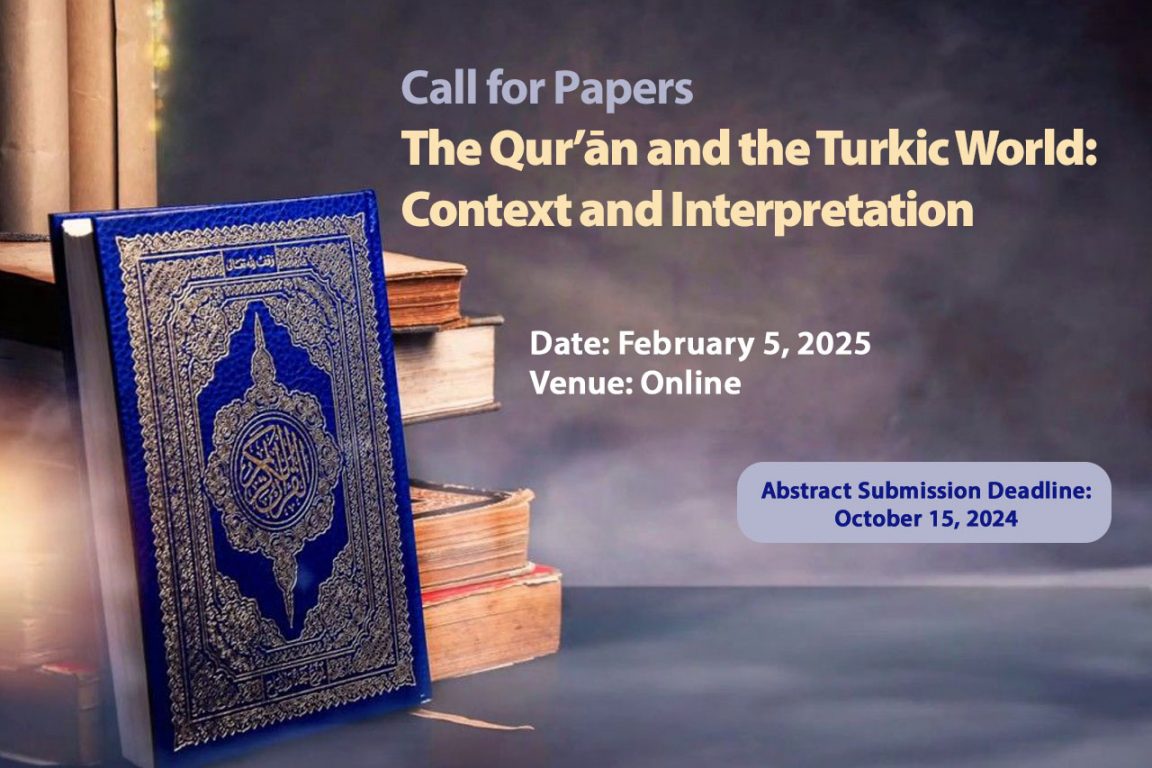The Qur’ān and the Turkic World: Context and Interpretation

About The Event
The Qur’ān and the Turkic World: Context and Interpretation
Call for Papers
Date: February 5, 2025
Venue: Online
Abstract Submission Deadline: October 15, 2024
The Qur’ān, the sacred scripture of Islam, profoundly impacts the culture, society and politics of the predominantly Muslim Turkic world. However, the interpretation and application of the Qur’ān varies depending on the historical, geographical and political context of each country. This online conference will analyze how the Qur’ān is understood and practiced in different communities of the Turkic world, and how it shapes their relationships with other regions and countries. This is an area of great potential regarding original research, at a time that the broader Turkic identity is strengthening, with chaos in neighboring regions.
Themes and Questions of the Research
This research seeks to elucidate the following topics:
- Transmission and Translation of the Qur’ānic Text among the Turkic World
- Discuss the historical and linguistic aspects of the transmission and translation of the Qur’ān among Turkic countries, including tafsīr production.
- Analyze the main challenges and opportunities of translating and interpreting the Qur’ān in different Turkic languages and dialects.
- Compare and contrast the different styles, methods and approaches of translation and interpretation across the Turkic world.
- The Qur’ān’s Impact on the Development of Islamic Culture and Identity in the Turkic States
- Examine the ways in which the Qur’ān has shaped the political, social and cultural identities and institutions of the Turkic world.
- Explore how the Qur’ān has interacted with other sources of authority and legitimacy, such as tribal traditions, customary laws, cultures and languages of the Turkic world.
- Assess how the Qur’ān has fostered diversity and pluralism, as well as unity and solidarity, within and across the Turkic world.
- The Qur’ānic Interpretive Methodology (Hermeneutics) and Frameworks in the Turkic World
- Identify the main interpretive methodology and frameworks (classical, modern, Ḥanafī/Māturīdī/Ashʿarī/Salafi/Sūfī etc.) used to understand/interpret the Qur’ān in the Turkic world.
- Discuss how different methodologies and frameworks have influenced various movements and trends of Islamic thought and practice among Turkic peoples.
- Scrutinize the ways in which Turkic countries have generated legal judgements, ethical principles, theological doctrines, mystical perceptions, artistic expressions and political ideologies from the Qur’ān.
- Compare and contrast the ways in which the Turkic world has adjusted and applied Qur’ānic teachings to particular historical and cultural backgrounds.
- Consider the challenges and opportunities for renewed engagement with the Qur’ān in the Turkic world and how this can contribute to the development of Islamic thought and practice in the region.
- Explore how the Qur’ān is approached in the face of modern issues such as migration, colonization, modernization, secularization, nationalism, globalization and democratization.
Prospective participants are requested to submit: (a) A short abstract (300-500 words) that outlines the aims, relevant literature, methodology and original contribution of the paper; and (b) A brief biography (max. 200 words) that includes the author’s academic background and research interests.
The selected papers will be published as an edited book after the conference via a reputable publisher. Based on the submitted papers, the edited book project might have two possible areas of focus: Modern period only, or Classical and modern periods.
Important Dates
- Abstract submission: 15 October 2024
- Notification of acceptance: 30 October 2024
- Announcement of final program: 15 November 2024
- For accepted proposals, extended abstract submission (1500 words) due: 15 January 2025
For further information and to submit proposals contact hcoruh@csu.edu.au.
More information on: Centre for Islamic Studies and Civilisation
Location
Online


We're always eager to hear from you.
If you’d like to learn more about us or have a general comments and suggestions about the site, email us at